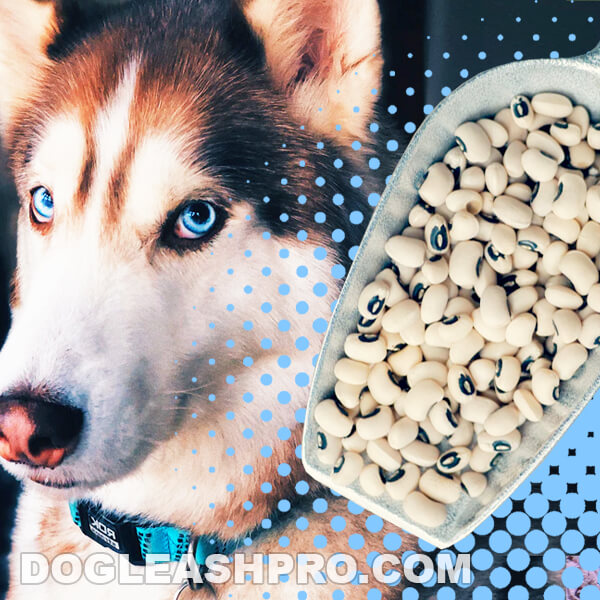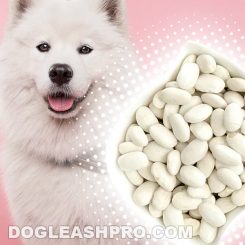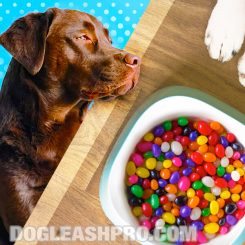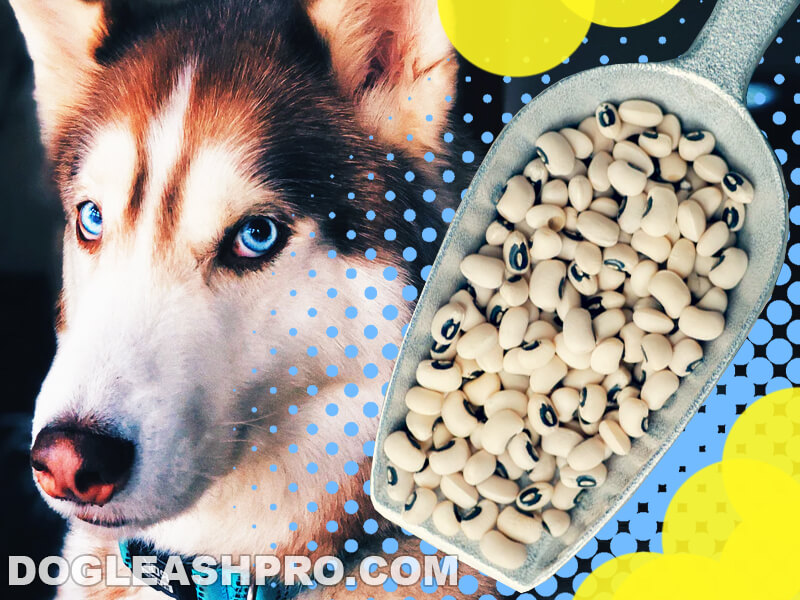
You’re probably preparing a dish with Black Eyed Peas and since they are healthy and delicious, you’re wondering if you can share these beans with your dogs. In this article, we’ll discuss whether you can feed your canine friends the Black Eyed Peas. Here’s the short answer first.
Can dogs eat Black Eyed Peas? Yes, dogs can eat Black Eyed Peas in moderation as these nutrient-rich beans are packed full of protein, iron, fiber, vitamin K, and complex carbohydrates. They are best served as an occasional treat or a supplement to your dog’s main meal.
Table of Contents
Can dogs have Black Eyed Peas?
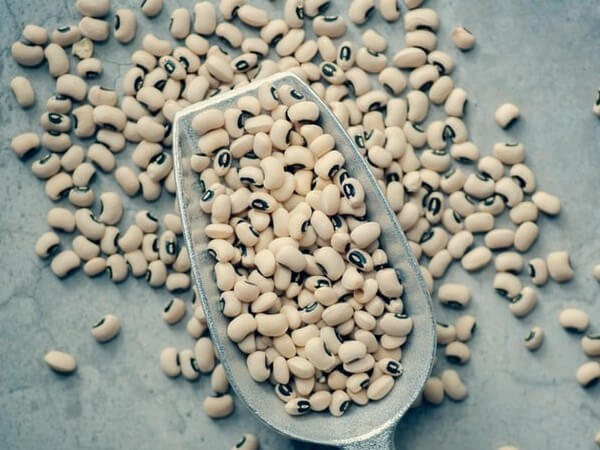
Yes, dogs can have Black Eyed Peas. Although they are called Black Eyed “Peas,” they are really just beans. These legumes are nutrient-rich and can be extremely beneficial to your dog’s health if consumed in moderation.
Let’s dive deeper and find out how each of the nutritional properties we mentioned above helps benefit your dog’s overall health.
Are Black Eyed Peas good for dogs?
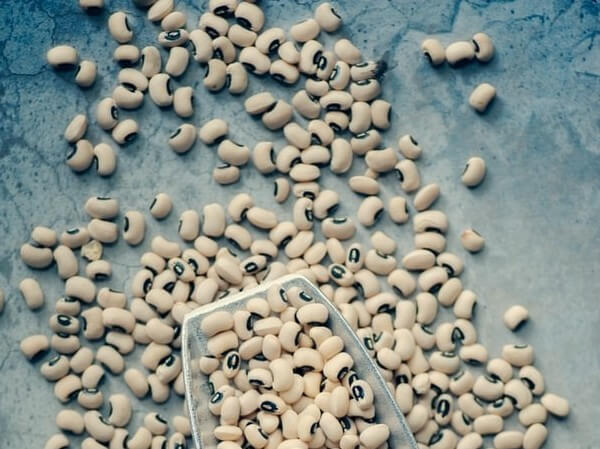
Black Eyed Peas are high in protein which helps build strong muscles in dogs
Feeding your pooch a moderate amount of Black Eyed Peas on an occasional basis is a good idea because these beans are packed full of protein. Your pooch needs protein so his or her body can function properly.
When dogs eat Black Eyed Peas, they receive the necessary amino acids from the protein which helps to build healthy and strong muscle, ligaments, tendons, cartilage, skin, hair, and nails.
Additionally, protein is vital to your dog’s hormone production. Your canine friends need 1 gram of protein per pound of their ideal body weight each day. For instance, a 40-pound dog at his ideal body weight needs 40 grams of protein per day.
If your pooch doesn’t receive the necessary protein intake, he will become malnourished rather quickly.
Signs and symptoms of malnourishment include the following:
- Overall body weakness.
- Unable to focus.
- Head bobbing.
- Limping.
- Shaking.
- Loss of appetite.
- Weight loss.
- Flaky and itchy skin.
Black Eyed Peas are high in complex carbs which provide dogs with energy
Unlike simple carbohydrates that give your dog that sudden spike in energy only to see them crash and burn a few minutes later, complex carbohydrates are digested more slowly so they release energy slowly as well. Your pooch needs complex carbs so he can have energy throughout the day.
Black Eyed Peas are a good source of fiber that helps maintain a healthy gut in dogs
Fiber is also essential in your dog’s diet. Ideally, dogs should receive between 2% to 4% of fiber from their daily diet. With the right amount of fiber in your pup’s diet, he will have a healthy gastrointestinal or digestive tract.
That’s because the good bacteria in your dog’s intestine ferment the fiber into fatty acids which helps to prevent bad bacteria overgrowth. Additionally, the fatty acids also help to maintain a healthy colon in dogs.
Moreover, if your pooch is having issues like constipation or diarrhea, try feeding him food high in fiber like the Black Eyed Peas. The fiber he receives from these beans will help their stools become more formed and firm since fiber absorbs excess water and increase the bulk of the stool.
With enough fiber intake, your four-legged friends will have bowel regularity as well as a healthy colon and digestive tract.
Lastly, if your pooch is diabetic or pre-diabetic, having some Black Eyed Peas is a good idea since the fiber helps to regulate blood sugar levels.
Black Eyed Peas are rich in iron to prevent anemia in dogs
When dogs have Black Eyed Peas in moderation, they will receive the necessary iron they need. Iron is vital in creating red blood cells which carry oxygen all throughout your dog’s vital organs.
With enough iron intake, you won’t have to worry about your pooch having anemia. Anemia only results within your K9 pals have an iron deficiency which means they do not have enough red blood cells.
Here are some signs and symptoms of anemia in dogs:
- Dizziness.
- Weakness.
- Difficulty breathing or shortness of breath.
- Pale skin.
Black Eyed Peas are rich in vitamin A for healthy skin and coat in dogs
You read that right! Black Eyed Peas are also rich in vitamin A. Vitamin A is crucial for helping your furry family members form soft tissues in their skin. As a result, your furry friends will have healthier, smooth, and moisturized skin and coats.
Black Eyed Peas contain vitamin K support healthy blood coagulation in dogs
Black Eyed Peas also contain a fat-soluble vitamin called vitamin K. Vitamin K is essential in regulating blood function in dogs. If your pooch is vitamin K deficient or has low levels of vitamin K, then their blood does not have the ability to clot properly. This can lead to excessive bleeding in dogs.
Also, vitamin K helps to metabolize protein in your dog’s body.
As we can see, having a moderate amount of Black Eyed Peas as an occasional treat or supplement to your dog’s main diet is a good idea.
But can Black Eyed Peas be bad for dogs? Let’s find out next.
Are Black Eyed Peas bad for dogs?
Black Eyed Peas can be bad for dogs if you feed your pooch too many of them. That’s because Black Eyed Peas are actually beans so they contain a substance called raffinose.
Raffinose can cause digestive issues like bloating, gas, or upset stomach in dogs because it can be a bit difficult for the dog’s body to digest.
Allowing your dogs to eat too many Black Eyed Peas means a high concentration of raffinose which causes digestive problems in dogs including soft stools or diarrhea so it’s best to stick to giving your canine friends just a moderate amount of this legume.
You might also like: Can Dogs Eat Brussel Sprouts?
Can dogs eat cooked Black Eyed Peas?
Yes, dogs can eat cooked Black Eyed Peas. In fact, this is the safest and best way to prepare these beans before you feed them to your K9 friends. Let’s go over in detail how to properly prepare Black Eyed Peas for your canine pooch.
How to prepare Black Eyed Peas for your dog
Here are two ways to prepare these legumes before giving them to your pooch.
1. Soak the Black Eyed Peas overnight
You’ll want to soak these beans overnight. Then, you can boil them until they are soft. Next, pour out the water and let the beans cool down and dry up a bit. Always cook the Black Eyed Peas fully and make sure they are plain without any added seasoning like salt, garlic, or onion.
2. Soak the Black Eyed Peas in a pot of warm water
If you’re short on time, there’s a quick way to soak the Black Eyed Peas. You can put a moderate amount of these beans in a pot of water and boil for about 2 minutes. After that, remove the pot from the stove and let it sit on the trivet for about an hour or so. The hot water will soften the beans much quicker.
Black Eyed Peas can be a food topper in which you sprinkle them on top of your pup’s main meal. You can also feed the Black Eyed Peas as an occasional treat to your canine friends.
If you’re making homemade meals for your pooch, you can occasionally add Black Eyed Peas as a secondary ingredient in their meal.
So, can dogs eat Black Eyed Peas?
As we can see, dogs can definitely eat Black Eyed Peas but moderation is key. With just the right amount of these beans, they can provide your canine family members with energy, healthy skin, coat, and digestive tract, prevent anemia, and support healthy blood coagulation in dogs.
Be careful not to feed your pups too many Black Eyed Peas because your pooch may have an upset stomach, diarrhea, and become very gassy.
Make sure to cook the beans fully before serving them to your furry pals and enjoy!
DISCLAIMER: THIS WEBSITE DOES NOT PROVIDE MEDICAL ADVICE
The information, including but not limited to, text, graphics, images and other material contained on this website are for informational purposes only. No material on this site is intended to be a substitute for professional veterinary advice, diagnosis, or treatment. Always seek the advice of your veterinarian or other qualified health care provider with any questions you may have regarding dietary needs.
Resources:
https://en.wikipedia.org/wiki/Legume
https://www.webmd.com/diet/health-benefits-black-eyed-peas#1

With over five years of specialized experience as an animal writer, my expertise lies in dog nutrition, health, behavior, grooming, and training. I am dedicated to delivering helpful and informative content that caters to the well-being of our furry friends. My primary goal is to empower pet owners with knowledge and ensure our canine companions thrive in health and happiness. In my free time, I love volunteering at local dog rescue centers.
